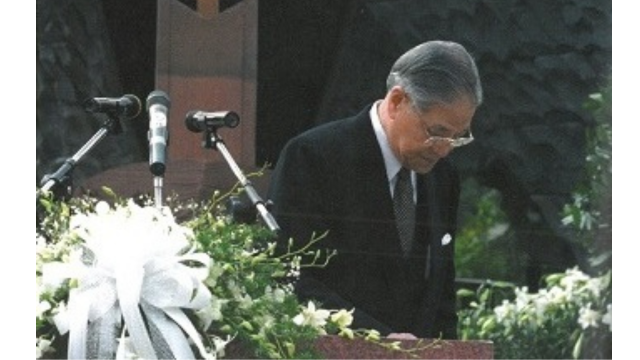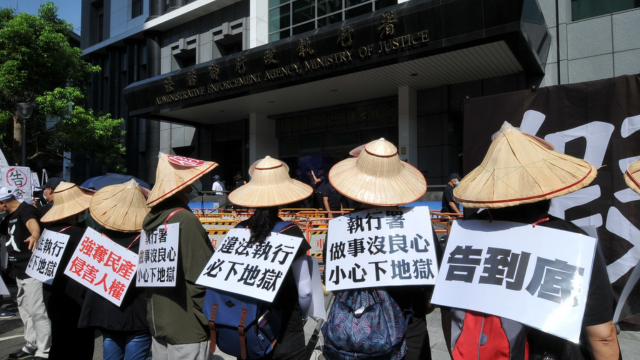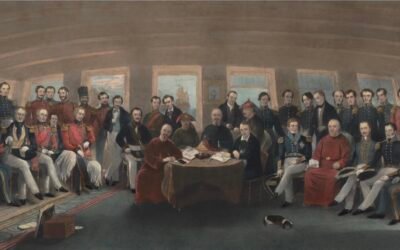The government of Taiwan apologized for the 228 Incident. It should also apologize for the Tai Ji Men case.
by Willy Fautré*
*A video paper presented at the conference “End State Persecution and Implement Transitional Justice: The Tai Ji Men Case as an Example,” organized in observance of 228 Peace Memorial Day, Taipei, February 28, 2025.

When I went to Taiwan for the first time and I saw the word “Incident” preceded by a three-digit number, I was wondering what it meant and how I had to read it. Was it
- Two two eight Incident?
- Two hundred twenty-eight Incident?
- What did it mean and what was that historic incident?
I was very perplexed as this looked to me very mysterious. I knew that Taiwan had been occupied for decades by the Japanese but they had survived their tyranny with their defeat in the Second World War. However, it was obviously not related to that period of its history.
The next pages of Taiwan’s history were not as rosy as its citizens had hoped but again they survived, until someone finally told me that the Incident, as it was called, took place in 1947 and was related to government agents killing a citizen while confiscating contreband cigarettes. So, my reading should have been 28 of February and I should have guessed by myself that the incident occurred in 1947 because the year was never associated to the Incident when I was looking around me in search of a full answer.
I then understood that it had been a very tragic important event as when we talk about 9/11, we all know what it is about and the year of the terrorist attacks in the United States does not need to be mentioned.
That Incident in 1947 quickly spread across the entire island because the brewing discontentment towards the then administration erupted into a force that acted as a catalyst behind the people’s demand for political reform. There were fightings, armed resistance, repression, torture, massacres and all sorts of atrocities. They were followed by a long period of dictatorship.
On 28 February 1995, the head of state apologized to the families of the victims of the Incident of 1947. A few months later, a Reparation Act was promulgated to compensate the victims of the Incident.

This period of Taiwan’s history is closely connected to the history of Tai Ji Men.
When an end officially came to Martial Law and the dictatorship in July 1987, democracy started to emerge slowly, very slowly, but the dictatorial thinking did not disappear from all the minds of the political leaders because the same ruling party then remained in power.
The Taiwanese people are known to be resilient. Throughout history, they have faced numerous challenges, from natural disasters to geopolitical tensions. Yet, they have continually demonstrated an unwavering spirit and determination to overcome adversity.
Tai Ji Men, its Shifu (Grand Master), Shimu (Shifu’s wife) and dizi (disciples) lived up to the reputation of their people in the face of adversity.
In March 1996, the first democratic presidential election was held in Taiwan. The party then in power from which the elected president came from criticized a number of religious organizations that had supported a rival candidate, endorsed by the abbot of a large Buddhist order, and indiscriminately persecuted many religious groups. Tai Ji Men never took sides with any political party but was also a victim of the political repression.
In April 1997, Dr Hong Tao-tze, the founder of the Tai Ji Men Qigong Academy, was illegally indicted by Prosecutor Hou for tax evasion. Dr Hong, his wife and dizi were sent to the detention center for several months. Tai Ji Men had of course never engaged in any tax evasion but it took them ten years to be declared non-guilty. In July 2007, the Supreme Court fully acquitted Tai Ji Men of all charges related to tax evasion in the final appeal.

Dr. Hong and his co-defendants received national compensation for the wrongful imprisonment they had suffered ten years earlier.
However, the National Taxation Bureau (NTB) ignored the full acquittal of Dr Hong and went on persecuting Tai Ji Men. Disregarding the decision of the Supreme Court, the NTB went so far as to confiscate in August 2020 some property of Tai Ji Men to recover an allegedly unpaid remaining tax.
Dr Hong is a living example of Taiwanese resilience and wants apologies from the authorities, as the head of the Taiwanese state apologized on 28 February 1995 to the families of the victims of the 1947 Incident. This would be real justice.

Willy Fautré, former chargé de mission at the Cabinet of the Belgian Ministry of Education and at the Belgian Parliament. He is the director of Human Rights Without Frontiers, an NGO based in Brussels that he founded in 1988. His organization defends human rights in general but also the rights of persons belonging to historical religions, non-traditional and new religious movements. It is apolitical and independent from any religion.
He has carried out fact-finding missions on human rights and religious freedom in more than 25 countries He is a lecturer in universities in the field of religious freedom and human rights. He has published many articles in university journals about relations between state and religions. He organizes conferences at the European Parliament, including on freedom of religion or belief in China. For years, he has developed religious freedom advocacy in European institutions, at the OSCE and at the UN.



